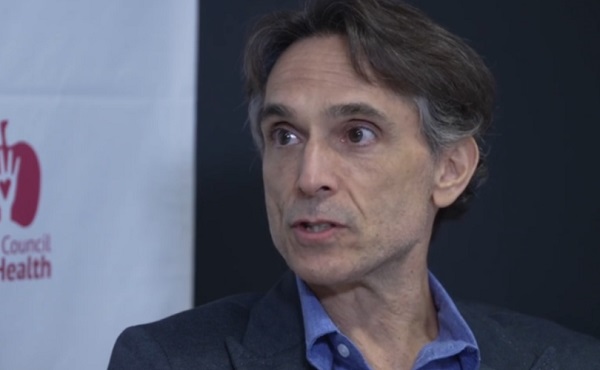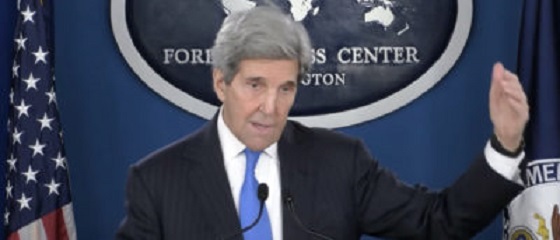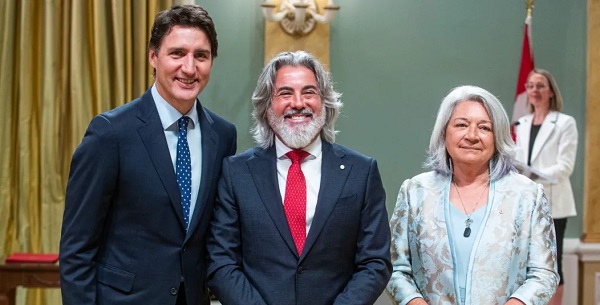COVID-19
Dr. Trozzi expresses optimism after day in court appealing to overturn ban on his medical license

From LifeSiteNews
The outspoken critic of COVID-19 shots said the judge appeared interested in learning more about the underlying cause of accusations made against him by the College of Physicians and Surgeons of Ontario.
Canadian medical freedom fighter Dr. Mark Trozzi passionately appealed his legal case before a court on Tuesday with the help of his lawyer. The outcome will determine whether he regains his right to practice medicine again after it was taken away because he spoke out against COVID shots.
Trozzi told LifeSiteNews he is “optimistic” about the outcome, noting that the judge seemed interested to find the underlying cause of accusations made against him by his medical regulator, the College of Physicians and Surgeons of Ontario (CPSO).
“I think the judge was pretty curious to dig into the science files which they (CPSO) ignored and see why I accused them of these things. They are counting on the judge to just think I am nuts and punish me for strong words,” Trozzi told LifeSiteNews after his hearing.
During the hearing, the CPSO had its lawyers go over their reasons for stripping Trozzi of his medical license earlier in the year.
His appeal case was heard by the Ontario Divisional Court (ODC). The banned doctor is hopeful he will be successful in having a decision overturned by the CPSO, which stripped him of his medical license earlier this year because he spoke out against COVID jabs and mandates.
According to Trozzi, who has 25 years of experience working in emergency rooms, the CPSO’s court “strategy was trying to make me sound crazy,” but he does not “think it will work.”
“I am optimistic that these judges are going to do their part to start restoring some sort of worthwhile future for their grandkids and ours,” he told LifeSiteNews.
Trozzi’s case, should it be successful, attorney Michael Alexander said it would have far-reaching legal implications that directly impact Canadians’ freedom of expression rights across “all domains of government regulation,” including all health colleges.
On January 25, the CPSO’s Discipline Tribunal, led by registrar Dr. Nancy Whitmore, stripped Trozzi of his license because he exposed the truth of the COVID ‘pandemic’ and its vaccines.
According to Trozzi, the CPSO left “little room” for “significant criticism or substantial challenge scientifically or legally” in what he referred to as its “kangaroo court” ruling that stripped him of his license.
“In essence the CPSO has just abused their authority and violated doctors, running their tribunal as a kangaroo court and torture chamber. Their science was minuscule, and they never even refuted the volumes of scientific evidence which we placed before them,” he told LifeSiteNews.
“We have them in the appeal court now to rope them in from their extreme abuse of power, for starters.
During the hearing, the CPSO, as noted by Trozzi, talked about its accusations against him, regarding COVID jabs as well as PCR tests.
“The CPSO talked about strong accusations I have made against them and others, for things such as experimental genetic injections not ‘safe and effective vaccines,’ no real pandemic, PCR scam, obstructed treatment, the criminality of the college,” he said.
“They climaxed these portions with quoting my most stern moments that are founded on those true accusations, things like ‘they should be prosecuted, imprisoned, lawfully hung.’”
The CPSO has thus far initiated legal action against Trozzi and at least five other doctors who are committed to their Hippocratic Oath responsibilities related to COVD: Mary O’Connor, Rochangé Kilian, Celeste Jean Thirlwell, Patrick Phillips, and Crystal Luchkiw.
Hearing panel ‘fair,’ Trozzi’s lawyer says
During the court hearing, Alexander made some exceptionally good arguments to support Trozzi’s claims that he was unfairly targeted by the CPSO in “biased” proceedings.
In speaking to LifeSiteNews, Alexander said in his view he felt that the hearing panel “was fair,” adding that he and Trozzi “had a good day.”
“I mean in the sense that I got out the core arguments that we needed to make to succeed in this,” he said.
“I don’t feel that the lawyers for the college really grappled with our arguments. They just repeated their own arguments. But I cannot say at the end of the day how the court will deal with that, but that’s my observation of it.”
Alexander told LifeSiteNews that as he has said before, the CPSO proceedings against Trozzi were “biased.”
“If my arguments are accepted about the fundamental errors, relating to the evidence that were made by the tribunal. If those are accepted it really impugns the entire decision and I would hope leads to an assumption that the proceeding was biased,” he said.
Alexander noted that once there is “evidence of bias,” the decision, in this case, the CPSO against Trozzi “must be overturned.”
“The proceeding certainly was biased, and I have argued that” he said.
Alexander noted how he had hoped for a full-day hearing, but he had to make do with a half-day hearing because the court is slammed with various cases.
A ruling in favor of Trozzi would overturn his medical license ban, but Alexander noted that a decision is not likely until the new year. LifeSiteNews will report on the judge’s ruling on today’s court hearing once that decision has been made public.
The hearing was open to the public, but the live stream suffered from outages for some, and others could not even log in, in after the capacity limit of the stream was reached.
In 2020 during the COVID crisis, Trozzi became concerned after the mainstream narrative regarding the virus and various public health emergencies were severely skewed.
He observed that his hospital’s ER was mostly empty despite claims they were overflowing.
Trozzi came under the CPSO spotlight for promoting alternative COVID treatments and publicly explained why the COVID shot is “not a vaccine.”
In retaliation for speaking out, he was barred from issuing medical exemptions for COVID-19 injections as well as masking requirements and testing, in 2021.
The CPSO has cracked down on numerous physicians who failed to comply with standard protocol during the COVID outbreak. It has done this so assiduously that Dr. Robert Malone spoke out last year against what he described as the “re-education” of dissident Canadian doctors.
COVID-19
The dangers of mRNA vaccines explained by Dr. John Campbell

From the YouTube channel of Dr John Campbell
There aren’t many people as good at explaining complex medical situations at Dr. John Campbell. That’s probably because this British Health Researcher spent his career teaching medicine to nurses.
Over the last number of years, Campbell has garnered an audience of millions of regular people who want to understand various aspects of the world of medical treatment.
In this important video Campbell explains how the new mRNA platform of vaccines can cause very serious health outcomes.
Dr. Campbell’s notes for this video:
Excess Deaths in the United Kingdom: Midazolam and Euthanasia in the COVID-19 Pandemic https://www.researchgate.net/publicat… Macro-data during the COVID-19 pandemic in the United Kingdom (UK) are shown to have significant data anomalies and inconsistencies with existing explanations. This paper shows that the UK spike in deaths, wrongly attributed to COVID-19 in April 2020, was not due to SARS-CoV-2 virus, which was largely absent, but was due to the widespread use of Midazolam injections, which were statistically very highly correlated (coefficient over 90%) with excess deaths in all regions of England during 2020. Importantly, excess deaths remained elevated following mass vaccination in 2021, but were statistically uncorrelated to COVID injections, while remaining significantly correlated to Midazolam injections. The widespread and persistent use of Midazolam in UK suggests a possible policy of systemic euthanasia. Unlike Australia, where assessing the statistical impact of COVID injections on excess deaths is relatively straightforward, UK excess deaths were closely associated with the use of Midazolam and other medical intervention. The iatrogenic pandemic in the UK was caused by euthanasia deaths from Midazolam and also, likely caused by COVID injections, but their relative impacts are difficult to measure from the data, due to causal proximity of euthanasia. Global investigations of COVID-19 epidemiology, based only on the relative impacts of COVID disease and vaccination, may be inaccurate, due to the neglect of significant confounding factors in some countries. Graphs April 2020, 98.8% increase 43,796 January 2021, 29.2% increase 16,546 Therefore covid is very dangerous, This interpretation, which is disputable, justified politically the declaration of emergency and all public health measures, including masking, lockdowns, etc. Excess deaths and erroneous conclusions 2020, 76,000 2021, 54,000 2022, 45,000 This evidence of “vaccine effectiveness” was illusory, due to incorrect attribution of the 2020 death spike. PS Despite advances in modern information technology, the accuracy of data collection has not advanced in the United Kingdom for over 150 years, because the same problems of erroneous data entry found then are still found now in the COVID pandemic, not only in the UK but all over the world. We have independently discovered the same UK data problem and solution for assessing COVID-19 vaccination as Alfred Russel Wallace had 150 years ago in investigating the consequences of Vaccination Acts starting in 1840 on smallpox: The Alfred Russel Wallace as used by Wilson Sy “Having thus cleared away the mass of doubtful or erroneous statistics, depending on comparisons of the vaccinated and unvaccinated in limited areas or selected groups of patients, we turn to the only really important evidence, those ‘masses of national experience’…” https://archive.org/details/b21356336… Alfred Russel Wallace, 1880s–1890s 1840 Vaccination Act Provided free smallpox vaccination to the poor Banned variolation Vaccination compulsory in 1853, 1867 Why his interest? C 1885 The Leicester Anti-Vaccination demonstrations (1885) Growing public resistance to compulsory vaccination Wallace’s increasing involvement in social reform and statistical arguments Statistical critique of vaccination Government data on: Smallpox mortality trends before and after compulsory vaccination Case mortality rates Vaccination vs. sanitation effects Mortality trends before and after each Act, 1853 and 1867 “Forty-Five Years of Registration Statistics, Proving Vaccination to Be Both Useless and Dangerous” (1885) “Vaccination a Delusion; Its Penal Enforcement a Crime” (1898) Contributions to the Royal Commission on Vaccination (1890–1896) Wallace argued: Declining smallpox mortality was due to improved sanitation, not vaccination Official statistics were misinterpreted or biased Compulsory vaccination was unjust Re-vaccination did not reliably prevent outbreaks These views were strongly disputed, then and now. Wallace had a strong distrust of medical authority He and believed in: Statistical reasoning Social reform Opposition to coercive government measures The primacy of environmental and sanitary conditions in health
COVID-19
FDA says COVID shots ‘killed’ at least 10 children, promises new vaccine safeguards

From LifeSiteNews
“This is a profound revelation. For the first time, the US FDA will acknowledge that COVID-19 vaccines have killed American children”
At least 10 children have died because of the COVID shots, according to a recently publicized email from Trump Food and Drug Administration (FDA) officials.
“At least 10 children have died after and because of receiving COVID-19 vaccination,” FDA Chief Medical Officer Vinay Prasad wrote on Friday in an email to staff, obtained by The Daily Caller.
“This is a profound revelation. For the first time, the US FDA will acknowledge that COVID-19 vaccines have killed American children,” Prasad said in the memo.
The finding corroborates that of the Centers for Disease Control and Prevention (CDC), which recently linked at least 25 pediatric deaths to the COVID shot, via information from the Vaccine Adverse Event Reporting System (VAERS). Both counts likely significantly underestimate the real number of pediatric deaths from the shots, considering that studies have found vaccine injuries have been seriously underreported to VAERS.
In his Friday memo, Prasad ripped the Biden administration for pressuring the injection of these experimental mRNA shots into children.
“Healthy young children who faced tremendously low risk of death were coerced, at the behest of the Biden administration, via school and work mandates, to receive a vaccine that could result in death,” wrote Prasad.
“In many cases, such mandates were harmful. It is difficult to read cases where kids aged 7 to 16 may be dead as a result of covid vaccines.”
The disturbing admission by the Trump administration’s health agency highlights the silence of the Biden administration about these deaths and raises further questions about its integrity or lack thereof.
“Why did it take until 2025 to perform this analysis, and take necessary further actions? Deaths were reported between 2021 and 2024, and ignored for years,” wrote Prasad. He acknowledged that the vaccines potentially killed more children on balance, considering that they had virtually no risk of dying from COVID.
“The truth is we do not know if we saved lives on balance,” he wrote. “It is horrifying to consider that the US vaccine regulation, including our actions, may have harmed more children than we saved. This requires humility and introspection.”
The Center for Biologics Evaluation and Research (CBER) will reportedly strengthen its safety protocols for vaccines, including by requiring more clinical trials as opposed to relying on antibody laboratory studies, modifying the annual flu vaccine release, and examining the effect of administering multiple vaccines in one round.
This year, the CDC removed COVID shots from its recommended “vaccines” for healthy children. A CDC panel had voted in 2022 to add the COVID shots to the childhood immunization schedule despite their experimental nature and the fact that they were produced in a fraction of the time ordinarily required to bring a vaccine to market.
The push for COVID shots for children was spearheaded at least in part by CBER Director Peter Marks, who pushed for full approval of the COVID shots even for the young and healthy and laid the foundation for COVID shot mandates.
A large, growing body of evidence shows that the mRNA shots were dangerous to human health in a wide variety of ways and caused deaths at a rate far exceeding usual safety standards for vaccines. As Dr. Mary Talley Bowden, an ear, nose and throat specialist in Houston, Texas, explained to Tucker Carlson in April:
Normally, the FDA will put a black box warning on a medication if there have been five deaths. They will pull it off the market if there have been 50. Well, according to VAERS, (the) Vaccine Adverse Event Reporting System – and it’s vastly under-reported, which I have seen firsthand – there have been 38,000 deaths from these COVID shots.
That number has since increased, according to VAERS, which now reports 38,773 deaths, 221,257 hospitalizations, 22,362 heart attacks, and 29,012 cases of myocarditis and pericarditis due to the COVID shot as of August 29, among other ailments.
-

 Business2 days ago
Business2 days agoBlacked-Out Democracy: The Stellantis Deal Ottawa Won’t Show Its Own MPs
-

 Agriculture2 days ago
Agriculture2 days agoHealth Canada pauses plan to sell unlabeled cloned meat
-

 Artificial Intelligence1 day ago
Artificial Intelligence1 day agoGoogle denies scanning users’ email and attachments with its AI software
-

 Health1 day ago
Health1 day agoOrgan donation industry’s redefinitions of death threaten living people
-

 Alberta2 days ago
Alberta2 days agoCarney forces Alberta to pay a steep price for the West Coast Pipeline MOU
-

 Alberta2 days ago
Alberta2 days agoIEA peak-oil reversal gives Alberta long-term leverage
-

 Daily Caller2 days ago
Daily Caller2 days agoJohn Kerry Lurches Back Onto Global Stage For One Final Gasp
-

 National2 days ago
National2 days agoAlleged Liberal vote-buying scandal lays bare election vulnerabilities Canada refuses to fix






